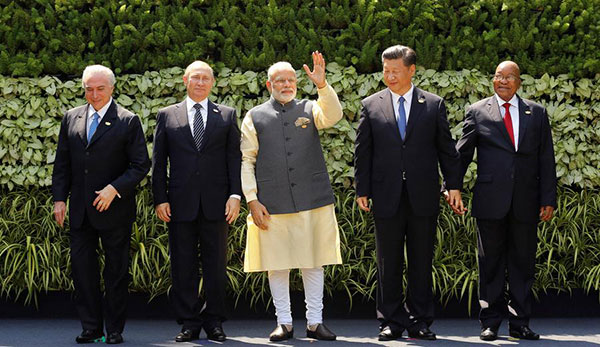Rising protectionism, anti-globalism big challenges to world's well-being
 |
|
Leaders of BRICS countries, from left, Brazilian President Michel Temer, Russian President Vladimir Putin, Indian Prime Minister Narendra Modi, President Xi Jinping, and South African President Jacob Zuma display their unity at the 8th BRICS Summit in Goa, India, on Sunday. [Photo/Agencies] |
The economies of the five BRICS countries — whose leaders met over the weekend in India — have slowed given the deep adjustments and challenges in the world economy, Xi noted in a meeting with business executives.
Among the challenges cited by Xi were the rising threat of protectionism and growing anti-globalization sentiment.
Still, Xi said, "The BRICS countries' advantages and potential in resources, markets and labor remain unchanged." He added that the executives should take a leading role in joint implementation of major projects.
The bloc is composed of emerging powerhouses Brazil, Russia, India, China and South Africa. The meeting was their eighth summit.
Xi spoke during the meeting in India's southwestern Goa state. The two-day summit concluded Sunday.
Xi noted that establishment of the bloc's New Development Bank is an important fruit of their cooperation, and China will support the bank's work to make its first group of projects successful.
Along with Xi, Brazilian President Michel Temer, Russian President Vladimir Putin, Indian Prime Minister Narendra Modi and South African President Jacob Zuma attended the summit.
While talking with the other BRICS leaders, Xi called on the countries to boost confidence at a time when economic recovery remains weak.
The bloc should increase macroeconomic policy coordination and oppose all forms of protectionism, Xi told the other leaders. China is slated to take the rotating presidency of BRICS next year.
Foreign Minister Wang Yi said at a news briefing that Xi's speech was hailed by the leaders at the summit.
The Goa Declaration issued at the summit's conclusion included some points of consensus the five leaders reached during the summit of the G20 major economies in Hangzhou last month, he said.
At their meeting on the G20's sidelines, Xi said BRICS members should enhance coordination to make emerging-market economies and developing countries play a bigger role in international affairs.
India is the final stop of Xi's tour of southern Asia, which has already taken him to Cambodia and Bangladesh.
Ruan Zongze, vice-president of the China Institute of International Studies, told China Daily that even though the economic growth of BRICS countries has slowed, the performance of emerging economies remains far better than that of developed countries.
"Since the recovery of the global economy after the 2008 financial crisis, the BRICS countries have contributed more than 50 percent of global economic growth," he said.
Contact the writers at [email protected]